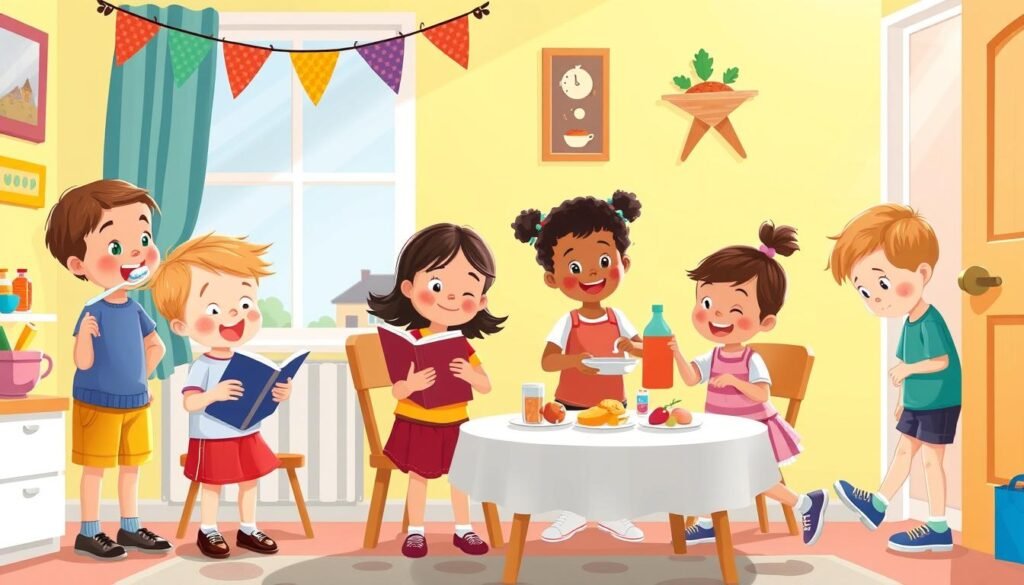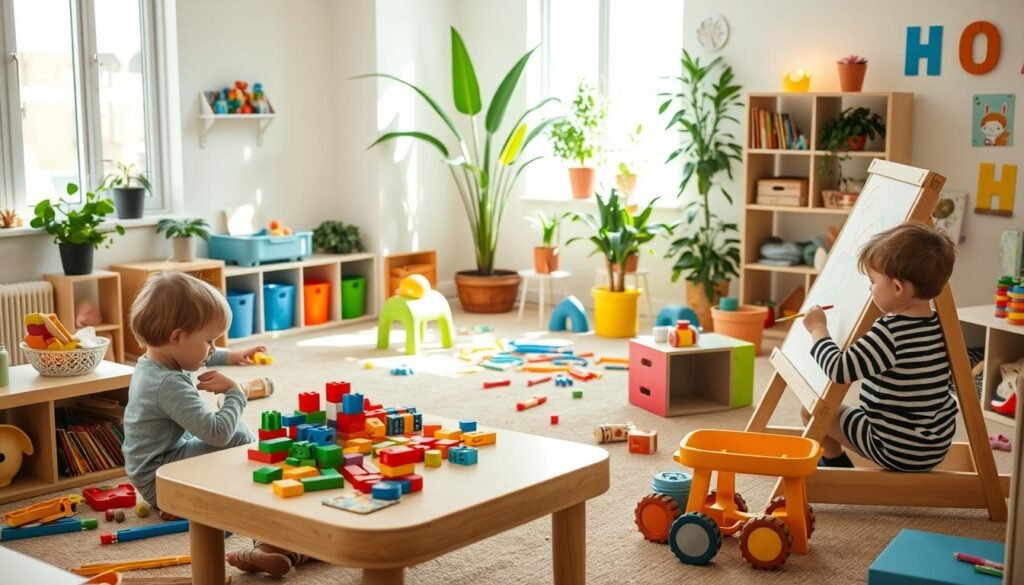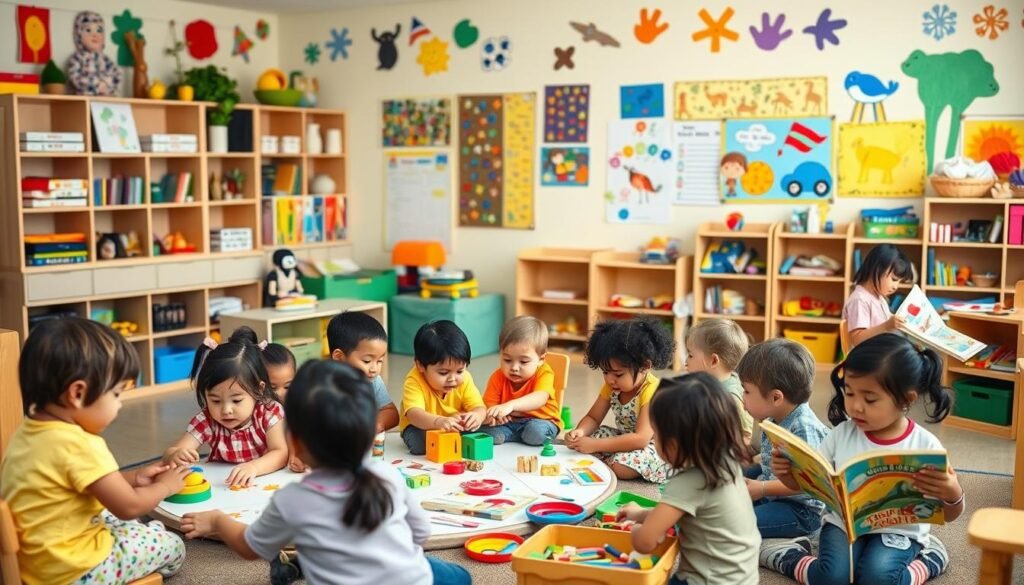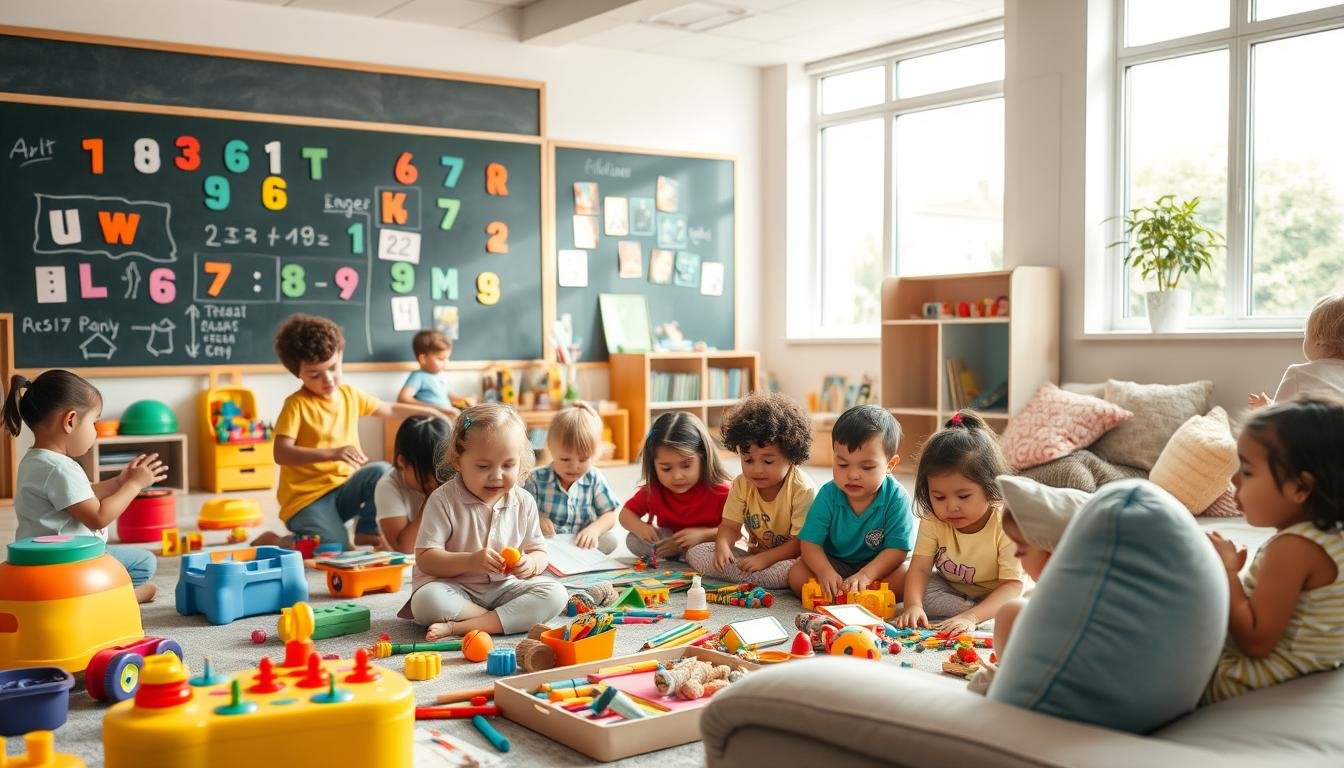Early childhood education is key for kids aged two to seven. It helps with thinking, social skills, feeling smart, learning language, and getting ready for school. Preschool uses play to teach these important skills.
Studies show that good preschools help kids do well in school and life. A study by the National Institute for Early Education Research found preschoolers do better in reading, writing, and math than those who didn’t go.
Preschool also teaches kids how to share, work together, and feel for others. These skills help kids make friends and deal with social situations as they grow up.
Early education sets the stage for a lifetime of learning and growing. Parents and teachers are key in helping kids during these early years.
Key Takeaways
- Preschool education significantly impacts cognitive, emotional, and social development in children aged two to seven.
- A structured preschool environment helps develop literacy, numeracy, and problem-solving skills through play-based learning.
- Early childhood education fosters crucial social-emotional skills such as sharing, cooperation, and empathy.
- Teaching basic literacy skills like reading and writing is essential for vocabulary and comprehension growth.
- Integrating routine activities that involve counting, naming objects, colors, and shapes enhances math, language, and fundamental skill development.
The Importance of Early Childhood Education
Early childhood education is key to a child’s future success. The years from two to seven are crucial for brain growth. Studies show that kids who get quality early education do better in reading and math by the fourth grade.
These early years are when kids learn important skills. They start solving problems, learning languages, and basic math. They also learn to share, work together, and control their feelings.
Cognitive, Emotional, and Social Development
Early education programs help kids grow creatively and socially. Kids in these programs learn to focus better and handle new things. Starting childcare early helps kids stay focused and manage their feelings.
Here are some interesting facts:
- Children who don’t go to nursery are 50% more likely to struggle in school.
- Preschool for 18 months has a bigger impact on reading and math at age 11 than primary school.
- There are only 2,000 days from birth to kindergarten, making early education critical.
Laying the Foundation for Future Academic Success
Early education does more than just teach in class. A long study in the U.S. found that adults with quality early education were more likely to work and go to college. It also helps kids avoid repeating grades and get ready for later school.
Early education also helps with physical health and well-being. Reading to kids often helps them with counting, writing, and reading. It builds their confidence and self-control, preparing them for success later in life.
Basic Literacy Skills
Teaching children to read and write is key in their early school years. Introducing the alphabet and letter sounds helps them build a strong foundation. Reading picture books and interactive stories not only grows their vocabulary but also sparks a love for reading.
Studies show that kids as young as three can start learning to read. Reading to infants as young as nine months can greatly help with language skills. By age three, kids should be able to tell stories they know and spot letters in their name. Around age four, they should recognize letters and know the difference between big and small letters.
Experts say there are six essential early literacy skills for reading and writing:
- Print awareness: Knowing how to handle a book and follow the text
- Letter knowledge: Recognizing different letters and their sounds
- Vocabulary: Growing a bigger vocabulary for better reading
- Phonological awareness: Hearing and playing with sounds in words
- Narrative skills: Telling stories, understanding sequences, and making guesses
Early literacy education makes a big difference, as seen in programs like Lightbridge Academy’s pre-K curriculum. Ninety-five percent of kids in this program tested ready for kindergarten last year. By loving books and reading, kids are more likely to want to learn to read on their own, preparing them for school success.
| Age | Literacy Milestones |
|---|---|
| 3 years old | Can start learning to read, retell familiar stories, and identify letters in their name |
| 4 years old | Should start recognizing letters and understanding the difference between uppercase and lowercase forms |
Early Learning Concepts
Teaching early learning concepts to kids is key for their brain growth and school success. By adding educational fun to daily life, parents and caregivers make learning fun and easy for young ones.
Incorporating Learning into Daily Activities
Counting steps, learning about household items, and spotting colors and shapes can be part of a child’s day. These everyday learning chances help kids practice math, language, and solving problems in a cozy setting.
Here are ways to mix learning into daily tasks:
- Count the number of toys while tidying up
- Name the colors of fruits and vegetables during mealtime
- Identify shapes in everyday objects like windows and doors
- Practice simple math by setting the table with plates and utensils
Enhancing Cognitive Development and Problem-Solving Skills
Getting kids involved in early learning boosts their brain power and creativity. By letting them explore and ask questions, parents and caregivers help them think critically. This skill is vital for their future.
| Skill | Activity | Benefit |
|---|---|---|
| Language | Storytelling and singing songs | Expands vocabulary and communication skills |
| Math | Sorting and comparing objects | Develops logical thinking and problem-solving |
| Creativity | Drawing and crafting | Encourages self-expression and imagination |
Creating a supportive and engaging space for learning helps kids develop a lifelong love for learning. This sets them up for success in school and beyond.
Establishing Good Habits and Routines
Teaching kids good habits early is key for their growth. A consistent schedule and encouraging responsibility help them learn valuable skills. These skills will help them throughout their lives.

Creating a Consistent Schedule
Children love structure and knowing what to expect. A daily schedule with regular times for meals and bed helps them feel safe. It also teaches them responsibility.
Studies show kids are more likely to adopt healthy habits if they see their parents doing the same. When making a schedule for your child, keep these tips in mind:
- Align routines with daily activities like waking up, meals, and bedtime
- Use habit stacking, where a new habit is introduced alongside an existing one
- Be patient and consistent, as it takes time for children to form new habits
- Provide positive reinforcement, such as praise and fun activities, to encourage good habits
Encouraging Responsibility and Discipline
It’s also crucial to give kids small tasks to help them grow. Tasks like picking up toys or setting the table make them feel important. It helps them learn self-discipline and independence.
| Age | Appropriate Responsibilities |
|---|---|
| 2-3 years | Putting away toys, helping with simple chores |
| 4-5 years | Setting the table, feeding pets, watering plants |
| 6-7 years | Making their bed, helping with laundry, preparing simple snacks |
When teaching kids about responsibility and discipline, remember to:
- Be clear and consistent with expectations
- Provide guidance and support as needed
- Praise efforts and progress, rather than just results
- Model responsible behavior in your own daily habits and self-care routines
“We are what we repeatedly do. Excellence, then, is not an act, but a habit.” – Will Durant
By teaching good habits and routines early, parents set their kids up for success. This foundation will help them in the future.
Communicating Needs Effectively
Teaching kids to say what they need is key in early learning. Parents and teachers play a big role in helping them. They guide and encourage open talk, helping kids feel confident and able to share their feelings and needs.
Studies show that talking often with adults and friends helps kids build better relationships. By joining in talks and asking for their thoughts, kids grow more confident. They also get better at listening and speaking. Learning to talk about feelings is also important for kids to share their emotions well.
When a child says they need something, like “I’m thirsty” or “Help with my shoes,” it’s important to listen and help. This makes them feel good about sharing their needs. It helps them grow in communication skills and self-expression.
To help kids talk better, parents and teachers should:
- Give clear, easy-to-understand requests
- Show they’re really listening
- Use pretend play to help kids talk more freely
- Show them how to talk clearly and well
For kids who find it hard to talk, getting medical help and using therapy and tech can help. By acknowledging requests and supporting kids in expressing needs, we help them become more confident and skilled in communication. This is important for their whole life.
Fostering Independence and Problem-Solving Abilities
As kids grow, it’s key to help them become independent and solve problems. Parents and teachers can boost their confidence by teaching them to think critically. This helps them face life’s challenges.

Studies show that a regular routine helps kids plan their day and take on tasks. Letting them choose within limits boosts their decision-making skills. Doing chores like cooking or cleaning helps them feel responsible and independent.
Encouraging Self-Reliance
Activities like puzzles or crafts improve problem-solving and determination. Giving kids space for creative play boosts their independence and creativity.
| Activity | Skill Development |
|---|---|
| Puzzles and crafts | Problem-solving, perseverance |
| Independent play | Creativity, self-reliance |
| Daily tasks and chores | Independence, responsibility |
Experts say kids face choices and learn every day. Letting them solve problems on their own builds their independence. Encouraging creativity helps them think differently and try new things.
Building Confidence and Critical Thinking Skills
Problem-solving games are great for all ages. It’s okay if kids fail, as it’s a chance to learn. Praise their effort, not just the outcome.
Learning to solve problems is an essential life skill that impacts success in academic learning, leadership, social relationships, athletics, finances, health, leisure skills, and all other areas of life.
Early childhood is crucial for brain development, with 90% happening before age four. Education during these years is vital for independence and critical thinking. Supportive environments and growth opportunities help kids build confidence and skills for success.
The Role of Preschool Teachers in Skill Development
Preschool teachers are key in growing young minds and sparking a love for learning early on. They give each child personalized attention, helping them grow and succeed.
To become a preschool teacher, you need a bachelor’s degree and must pass a state exam. Some jobs ask for an associate degree in early childhood education or a Child Development Associate (CDA) certificate. Important qualities include:
- Patience and compassion
- Creativity and flexibility
- Excellent communication skills
- Strong organizational abilities
- A genuine passion for teaching and working with young children
Designing Engaging Lessons and Activities
Teachers create lessons, games, and activities that match each child’s interests and needs. They use engaging materials and encourage creativity through arts, crafts, and play. This helps kids learn important skills while enjoying themselves.
“Play is often talked about as if it were a relief from serious learning. But for children, play is serious learning. Play is really the work of childhood.” – Fred Rogers
Applying Early Learning Standards
Preschool teachers make sure their lessons meet state early learning standards. These standards show what kids should know and do by a certain age. They help in areas like language, math, and social skills.
| Domain | Skills |
|---|---|
| Language and Literacy | Listening, speaking, reading, writing |
| Cognitive Development | Problem-solving, critical thinking, math concepts |
| Social-Emotional Learning | Self-awareness, empathy, relationship skills |
| Physical Development | Gross and fine motor skills, health and safety |
By focusing on each child’s needs and using engaging materials, preschool teachers prepare them for a lifetime of learning and success.
Developing Essential Skills in Preschool
Preschool education is key in building skills for life. In the first five years, a child’s brain grows fast. This time is vital for learning and growing.
Teachers create fun activities to help kids learn. They focus on thinking skills, language skills, reading skills, writing skills, and math skills.

To improve thinking skills, teachers ask deep questions. They give kids materials to explore and solve problems. This helps kids think critically and solve problems.
Language skills grow through games, songs, and stories. Kids learn new words and improve their vocabulary.
Preschool introduces reading skills early. Kids learn letters, sounds, and how to listen. They start to read simple words and practice writing.
| Skill Area | Key Activities | Benefits |
|---|---|---|
| Gross Motor Skills | Climbing, throwing, catching balls, action songs | Physical development, coordination |
| Fine Motor Skills | Painting, drawing, cutting, threading | Hand-eye coordination, dexterity |
| Math Skills | Counting, number recognition, real-world concepts | Foundation for mathematical thinking |
| Social Skills | Sharing, cooperating, taking turns, resolving conflicts | Emotional intelligence, relationship building |
| Listening Skills | Music sessions, discussions, story listening | Attention span, comprehension, following directions |
Preschool also teaches social skills like sharing and cooperation. These skills help kids in the future. Teachers also teach kids to be independent, like setting up their lunches.
Play is often talked about as if it were a relief from serious learning. But for children, play is serious learning. Play is really the work of childhood. – Fred Rogers
Play is a big part of preschool. It helps kids learn and grow. Preschool prepares kids for a lifetime of learning.
Early Childhood Education: Top 5 Things to Teach Your Child
Early childhood education is key in shaping a child’s holistic development and setting the stage for lifelong learning. Parents and educators can teach children essential skills for making positive contributions to society. Here are the top five things to teach your child in their early years:
Basic Literacy Skills
Start teaching reading, writing, and comprehension early for future success. Read with your child daily, let them play with writing tools, and enjoy interactive stories together.
Early Learning Concepts
Teach counting, colors, shapes, and problem-solving through play. Use these concepts in daily life, like sorting laundry or counting steps. The demand for educational toys that boost cognitive skills is growing, reaching $36 billion by 2025.
Good Habits and Routines
Creating a consistent schedule and teaching responsibility are vital. Develop a daily routine with self-care activities and assign chores. Schools with play areas see a 15% increase in attendance and grades, showing play’s positive impact.
Communicating Needs Effectively
Teach children to express their needs and feelings well. Listen to them, validate their emotions, and teach them to speak their minds. Children spend 4-6 hours a day playing, which is crucial for their development and communication.
Independence and Problem-Solving Abilities
Encourage independence and critical thinking to help children face challenges. Let them try tasks on their own, but guide them when needed. Engage them in puzzles and open-ended play to boost logical thinking and creativity. Outdoor play can reduce the risk of myopia by 13%, showing its importance for development.
By focusing on these five areas, parents and educators can give children a solid foundation for holistic development and lifelong learning. A mix of structured learning and play helps children develop essential skills for making positive contributions to society.
Preparing Children for a Lifetime of Learning
Early childhood education is key in empowering kids and sparking a lifelong love for learning. It lays a strong foundation for their future. This helps them grow into positive contributors to society.
The first five years are crucial for a child’s brain development. Preschool teachers and parents play a big role in supporting this growth. They help kids develop important skills like reading, math, and social skills.
Studies show early experiences greatly impact brain development and future learning. Negative experiences can harm a child’s brain and behavior. But, supportive relationships and interventions can help overcome these challenges.
Early education offers kids a chance to explore through play. Activities like sand play and water play help with coordination and learning. Dress-up and drawing also boost social and self-expression skills.
Quality early education empowers kids to be lifelong learners. It prepares them to make a positive impact on society. With the right support and activities, kids can develop the skills needed for success.
Conclusion
Early childhood education is key for a child’s growth. It helps with learning, feelings, and social skills. This sets them up for success in life.
Parents and teachers focus on important skills. These include reading, learning basics, and solving problems. This gives kids a strong start for the future.
Studies show happy, healthy kids do better in school. They are more eager to learn and get along well with others. This makes them ready for preschool and beyond.
Teachers are vital in helping kids grow. They build trust and teach important life skills. This helps kids become lifelong learners and positive contributors.


Leave a Reply